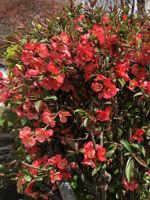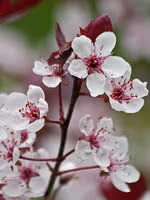Mon-Fri 9am - 5pm Mountain time
Purple Leaf Sand Cherry vs Japanese Quince
Chaenomeles japonica
Prunus x cistena
NOT AVAILABLE THIS SEASON - MIGHT RETURN
CUSTOM GROW
Japanese Quince has bright, orange to red showy flowers that bloom in early spring. The flowers appear before the leaves and may continue to bloom after leaves emerge. Flowers grow on old wood, so pruning after flowering will help to promote new growth next spring. They produce yellow-green fruit that taste bitter when eaten raw, typically they are better suited for making preserves.
It can be used as a stand alone ornamental shrub, as a low hedge, or can be trained to grow against a wall. In late winter, branches of Japanese Quince can be cut and brought indoors where they will bloom on their own. They are deer and rabbit tolerant. The branches are spiny making them well suited for keeping unwanted wildlife away.
Purple Leaf Sand Cherry provides bright reddish-purple leaves that turn bronze-green in the fall. In the spring, tiny flowers with a pinkish white hue bloom. The flowers are small, but the impact comes from the shrub blossoming all at once.
The Purple leaf sand cherry can be susceptible to pests and diseases in more humid areas; a typical life span is approximately 15 years. Not suitable for a privacy hedge on its own but is often alternated with lilacs. Often used as an accent plant that attracts birds and bees.
Japanese Quince Quick Facts
Purple Leaf Sand Cherry Quick Facts
Toxicity: the leaves and seed are slightly toxic

